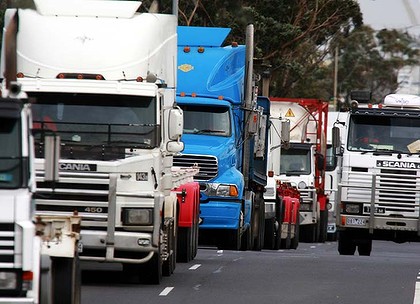The Age: Truck plan for nights, weekends Josh Gordon (May 14, 2012)
Cars and trucks do battle on the approaches to the Westgate bridge on the Westgate Freeway. Photo: James Davies
The state government will tackle a near doubling of trucks on Melbourne’s roads over the next decade by ordering the port operator to shift more freight at night and on weekends.
Port of Melbourne Corporation estimates suggest the much-touted expansion of Webb Dock, at the top of Port Phillip Bay, will meet only part of the increase in container trade over the next decade. A much larger expansion of the port’s main facilities at Swanson Dock is also on the cards, although it is likely to occur gradually.
The port, Australia’s largest, handles about 2.5 million containers a year, but this is expected to increase to more than 5 million by 2025. Part of this will be met by the $1.2 billion Webb Dock development, expected to handle 1 million to 1.3 million containers.
Port chief executive Stephen Bradford confirmed capacity at Swanson Dock would also need to almost double, from about 2.2 million containers to about 4 million.
The increase in truck traffic linked to the expansion would be dealt with by building direct ramps linking Webb Dock to the M1 in both directions and by using tendering requirements to ”bias” truck delivery times to off-peak periods, he said.
”We see a general move to more night and weekend delivery of containers out into the suburbs,” Mr Bradford said. ”In the off-peak hours, we don’t think Victorians will object to more trucks on roads in the early hours of the morning. With noise walls on our freeways, [and] the freeways effectively empty, why not use them?”
The comments come amid growing alarm that the government has no plan to tackle worsening congestion on Melbourne’s roads. By the end of the decade, freight trucks are expected to be travelling about 9.7 billion kilometres a year on Melbourne’s roads, almost double the 5.5 billion kilometres currently travelled. Freight trucks are likely to account for about 20 per cent of all travel in Melbourne, up from about 15 per cent.
The previous Labor government’s Freight Futures study warned that in the absence of ”substantial intervention”, the cost of congestion would double to up to $5.2 billion a year.
Ports Minister Denis Napthine said a key component of the Webb Dock development was the construction of a dedicated port road to access the M1, removing all port trucks from Williamstown Road and other local roads.
He said the potential operators of Webb Dock would also be asked to show how they will use state-of-the-art traffic management systems to control the flow of trucks on to the M1, avoiding peak times. But the plan to manage traffic out of Swanson Dock will also hinge on the east-west freeway link, unlikely to be built for years.
Opposition ports spokesman Tim Pallas accused the government of failing to inform the public of its plans to double the capacity of Swanson Dock because it had no plan to deal with truck congestion.
